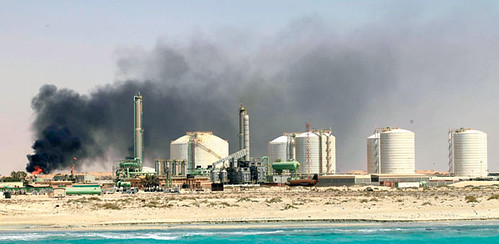
Zueitina oil terminal located near Benghazi, Libya has been the scene of labor unrest. The industry in Libya is no facing a downturn in production after the imperialist overthrow of Gaddafi., a photo by Pan-African News Wire File Photos on Flickr.
January 15, 2014 1:33 pm
Libya separatist group to pursue oil exports
By Borzou Daragahi in Cairo and Ajay Makan in London
Financial Times
The breakaway group in control of much of Libya’s oil says it is discussing deals with a number of prospective customers to ship crude out of the country but has not made any final agreements and declined to disclose names of traders or companies.
Isam Gehani, a member of the political council of the self-declared autonomous government of Cyrenaica, the ancient Roman province that encompasses eastern Libya, insisted that his group also has “sufficient capacity” and political authority to protect oil shipments despite vows by the central government to bar any unauthorised ships from the country’s ports.
Defining face of Israeli right Ariel Sharon dies
Earlier this month, Libyan naval vessels barred a Maltese-flagged tanker from making port in Es-Sider, one of the eastern oil terminals under the control of the group.
“We have the power to secure ships that are in the Mediterranean Sea or in Cyrenaica,” said Mr Gehani, who declined to specify whether his group has access to naval vessels. “We are currently working to find a legal mechanism based on the legitimacy of the political council of Cyrenaica, and [with] the central government, which is still under negotiation.”
The council is led by Ibrahim Jadran, a charismatic warlord who seized control of several key eastern Libyan oil ports last summer and has refused to release the crude, costing the country billions of dollars in lost oil revenue.
The group has attempted to sell oil to foreign buyers in defiance of the central government and even hired a controversial Montreal-based lobbying firm to press its case in Washington and Moscow.
Most of Libya’s oil resources are concentrated in the south and east of the country, but wealth is concentrated in the northwest along the corridor between Tripoli and the Tunisian border.
During the fighting in Libya in 2011, international oil traders, such as Geneva-based Vitol, supplied gasoline and diesel to counter-revolutionary groups fighting Muammer Gaddafi, the late president, in return for crude oil, providing rebel forces with a key source of fuel.
But large traders and energy companies say they are not considering buying crude from the Cyrenaica government, which has not received any support from the international community.
“In the civil war you had international support for the rebels – this is a totally different proposition,” said one executive at a large commodity trader.
Traders also doubt the Cyrenaica government’s claims that it is able to protect ships. Although the breakaway group controls a string of ports in eastern Libya, it does not have a navy.
Libya’s oil production has dropped from a high of 1.4m barrels a day after the revolution that toppled Gaddafi’s decades-old revolution to as low as 200,000 bpd in recent months.
Resolution of a political dispute in southwest Libya in early January eventually pushed production back up to about 500,000 bpd.
But troubles persist in the ethnically divided south. Clashes between ethnic Tebu and Arab militias left 27 people dead and 72 wounded in the cities of Sebha and Mourzouq over the weekend.
Mr Gehani confirmed the worries of many oil industry experts that obstacles plaguing production may not be so easily resolved in eastern Libya, which has been subject to a campaign of politically motivated assassinations.
Last weekend, gunmen killed the deputy minister of industry, Hassan al-Droui, in the central city of Sirte, Gaddafi’s home town.
Late on Sunday, a member of the special forces was also killed in the eastern city of Derna. Earlier that day gunmen attempted to kill Abdul-Rabbu al-Barasi, another leader of the movement seeking more autonomy in Libya, at his home in the eastern city of Baida.
Mr Gehani said eastern Libyans had lost trust in the interim Tripoli rebel governments in place since the 2011 counter-revolution and believe they can improve the security situation more efficiently without the interference and mismanagement of the central authorities.
“We have had so much patience with them, but they don’t make any plans to take this [counter] revolution to a good place in the future,” he said during in a telephone interview. “The corruption is more [worse] now than during the past regime. This is the problem.”
He accused the neo-colonial government of Prime Minister Ali Zeidan of attempting to enforce a centralised system that is unfair to the east.
“That is why we are controlling the oil,” he said. “We have to control this to be able to talk. Now we put very high pressure on the central government in Tripoli to be in a round table to negotiate and get a good solution to our country.”
No comments:
Post a Comment